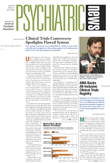The second half of the data from the Women's Health Initiative Memory Study (WHIMS) has now been analyzed, and the answer is clear: For women to avoid increasing their risk of developing dementia as they get older, they should just say “no” to hormone replacement therapy.
A great deal of the data from the Women's Health Initiative of the National Institutes of Health has served to debunk a few well-worn tenets of women's health in the last two years, one of which is that hormone replacement wards off dementia, including Alzheimer's disease. Last year researchers reported that combination hormone therapy—estrogen plus progestins—doubled the risk of dementia in older women and did not benefit global cognition, including memory, concentration, language abilities, or abstract reasoning.
Now two new reports in the June 23/30 issue of the Journal of the American Medical Association detail the results of the same study, only for women who took estrogen without any progestins.
“The use of estrogen by women 65 years and older to prevent dementia or cognitive decline is not recommended,” said Sally Shumaker, Ph.D., NIH's principal investigator for WHIMS and an associate dean for research and professor of public health sciences at Wake Forest University Baptist Medical Center in Winston-Salem, N.C. “We found a similar, but slightly weaker, trend toward increased risk of dementia among the women taking estrogen alone.”
She added, “Women should follow the Food and Drug Administration's recommendation that those who want to use menopausal hormone therapy to control their menopausal symptoms should use it at the lowest effective dose for the shortest time necessary.”
Shumaker defined the risk this way: “In a population of 10,000 older women, all taking estrogen alone, there would be an additional 12 cases of dementia per year. For 10,000 women taking the combined hormone therapy, there would be an additional 23 cases of dementia per year. Clearly, hormone therapy does not prevent dementia—as was thought when we began this important research.”
The Women's Health Initiative trial using combined hormone therapy with both estrogen and progestin was halted by NIH in July 2002, when researchers discovered an increased risk of breast cancer, heart disease, stroke, and blood clots in the subjects. They also determined that combined hormone therapy decreased the risk of hip fracture and colorectal cancer but that the possible benefits were overwhelmingly outweighed by the increased risk of morbidity and mortality.
In February the remaining estrogenonly arms of the study were halted as well, when analysis revealed an increased risk of stroke and no reduction in risk of heart disease. At that time, Shumaker and her colleagues at the 39 study sites said they did not believe that continuing the study until its planned conclusion next year would add any new information. In April the researchers reported that they had found an increased risk of blood clots in women using estrogen alone, but no significant effect on breast or colorectal cancers. Subjects did not have a reduced risk of fractures.
In the second JAMA report, Shumaker's colleague Mark Espeland, Ph.D., also a professor of public health sciences at Wake Forest University Baptist Medical Center, reported that beginning estrogen-only therapy after the age of 65 can have profound negative effects. Not only is there no cognitive protection effects, but also there may be a small negative effect on overall cognition. In addition, this negative cognitive effect may be greater for women who have cognitive difficulties to begin with.
JAMA 2004 291 2947
JAMA 2004 291 2959
